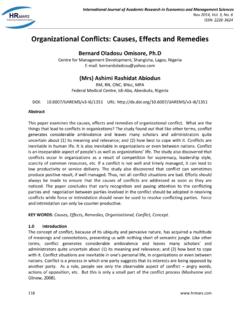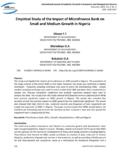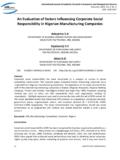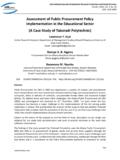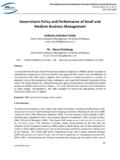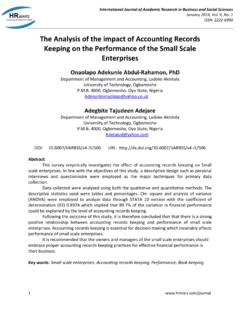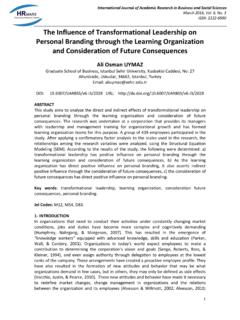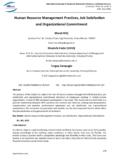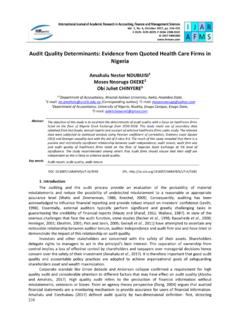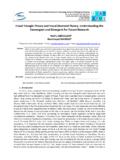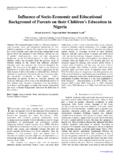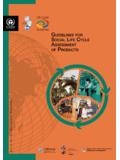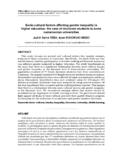Transcription of Human Capital Development and Economic …
1 International Journal of Academic Research in Business and Social Sciences April 2014, Vol. 4, No. 4. ISSN: 2222-6990. Human Capital Development and Economic Growth: The Nigeria Experience God'stime Osekhebhen Eigbiremolen1. Department of Economics, University of Nigeria, Nsukka E-mail: Uchechi Shirley Anaduaka Department of Economics, University of Nigeria, Nsukka E-mail: DOI: URL: Abstract This study employs the augmented Solow Human - Capital -growth model to investigate the impact of Human Capital Development on national output, a proxy for Economic growth, using quarterly time- series data from 1999-2012. Empirical results show that Human Capital Development , in line with theory, exhibits significant positive impact on output level.
2 This implies that Human Capital Development is indispensable in the achievement of sustainable Economic growth in Nigeria, as there is an increase in Economic performance for every increase in Human Capital Development . The results further reveal a relatively inelastic relationship between Human Capital Development and output level. Going forward, government and policy makers should make concerted and sincere efforts in building and developing Human capacity through adequate educational funding across all levels. This remains the major way of attaining sustainable Economic growth and Development in any economy. Keywords: Human Capital Development , Economic growth, expenditure on education.
3 JEL Classification: E2, E6, H52, O11. Introduction The concept of Human Capital refers to the abilities and skills of Human resources of a country, while Human Capital Development refers to the process of acquiring and increasing the number of persons who have the skills, education and experience that are critical for Economic growth and Development of a country's economy (Okojie, 2005). Also, Ejere (2011) posited that Human Capital refers to the Human factor in the production process; and consists of the combined knowledge, skills or competencies and abilities of the workforce. Of all factors of production, only Human beings are capable of learning, adapting or changing, innovative and creative.
4 Human Capital formation or Development , following Harbison (1973), can be seen as the deliberate and continuous process of acquiring requisite knowledge, skills and experiences that 1 Corresponding author 25. International Journal of Academic Research in Business and Social Sciences April 2014, Vol. 4, No. 4. ISSN: 2222-6990. are applied to produce Economic value for driving sustainable national Development . The significance and relevance of Human Capital Development in the achievement of meaningful and sustainable Economic growth and Development have been widely acknowledged in various studies. In the absence of substantial investment in the Development of Human Capital in any country, sustained Economic growth and Development would only be a mere wish, never a reality.
5 Therefore, the place of Human Capital Development in Economic growth cannot be overemphasized. Human Capital Development is a key prerequisite for a country's socio- Economic and political transformation. Among the generally agreed causal factors responsible for the impressive performance of the economy of most of the developed and the newly industrializing countries is an impressive commitment to Human Capital formation (Adedeji and Bamidele, 2003; World Bank, 1995, Barro, 1991). Furthermore, It has been stressed that the differences in the level of socio- Economic Development across nations is attributed not so much to natural resources and endowments and the stock of physical Capital but to the quality and quantity of Human resources (Dauda, 2010).
6 Oladeji and Adebayo (1996) opined that Human resources are a critical variable in the growth process and worthy of Development . They are not only means but, more importantly, the ends that must be served to achieve Economic progress. In addition, the wealth and prosperity of nations rest ultimately upon the Development of people and the effective commitment of their energies and talents. Capital and natural resources are passive agents. The active agents of modernization are Human beings, for they alone can accumulate Capital , exploit natural resources and build political and social organizations (Sankay, Ismail and Shaari, 2010). Harbinson (1973) aptly summarized the importance of Human Capital to Economic and Development by stating that Human resources constitute the ultimate basis for the wealth of nations.
7 Capital and natural resources are passive factors of production; Human beings are the active agents who accumulate Capital , exploit natural resources, build social, Economic , and political organizations, and carry forward national Development . Clearly a country which is unable to develop the skills and knowledge of its people and to utilize them effectively in the national economy will be unable to develop anything else . Background of the Study Nigeria's major objective has been to attain stability, material prosperity, peace and social progress. However, this has been hampered as a result of internal problems. These include inadequate Human Development , primitive agricultural practices, weak infrastructure, and uninspiring growth of the manufacturing sector, a poor policy and regulatory environment and mismanagement and misuse of resources.
8 In order to ensure the economy delivers on its potentials, the country experimented with two Development philosophies-a private sector-led growth in which the private sector served as the engine house of the economy and a public sector driven growth in which the government assumed the commanding heights of the economy. The initial low level of private sector Development , however, led to public sector dominance of the economy, encouraged by growth in the oil sector (UNDP, 2009) in Dauda (2010). In time past, prominence had been placed on amassing physical Capital to the detriment of Human Capital in Nigeria's quest for rapid socio- Economic progress.
9 However, earlier Development plans which virtually ignored the social or Human aspects of Development did little to accelerate the pace of growth and Development in the country. But since 1990, when 26. International Journal of Academic Research in Business and Social Sciences April 2014, Vol. 4, No. 4. ISSN: 2222-6990. the United Nations Development Programme (UNDP) started publishing the Human Development Report year after year, the Human Development pathway to Development has gained currency in many developing countries including Nigeria. Developing Nigeria's Human Capital is critical especially now that the country is aspiring to be among the 20 leading economies in the world by the year 2020.
10 But this aspiration will be a venture in futility so long as Human Capital formation is not accorded high priority. Human Capital formation is a prerequisite for Nigeria and Nigerians to become competitive in the 21st century globalize economy which is skill and knowledge based. A country's competitiveness in the New International Economic Order (NIEO) is strongly connected to the quality of her Human Capital . Hence Human Capital formation is undoubtedly the pivot for any meaningful programme of socio- Economic Development of Nigeria; and indeed of any country (Ejere, 2011). The objective of this study is to critically evaluate the effect or impact of Human Capital Development on Economic growth in Nigeria, using quarterly data.
